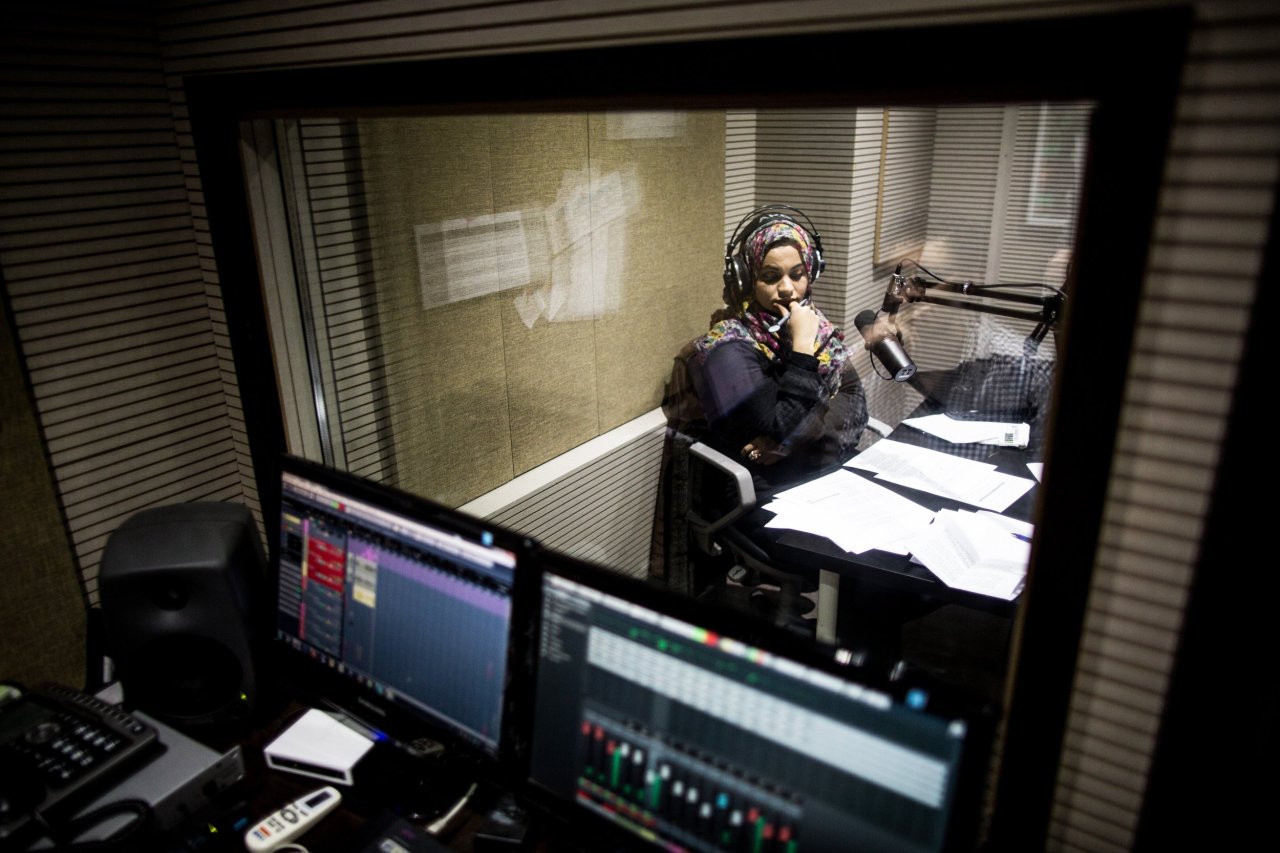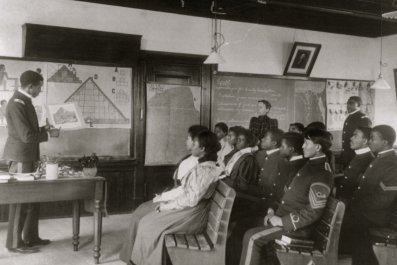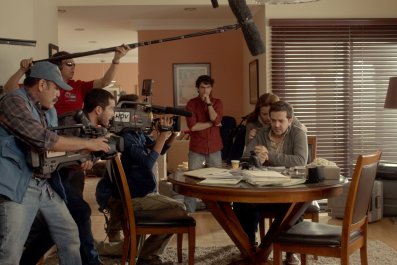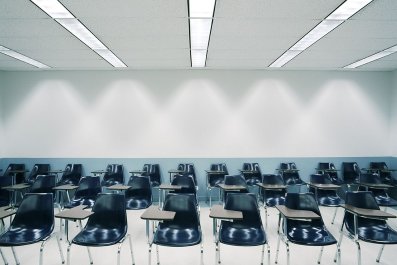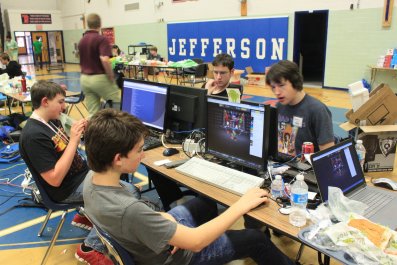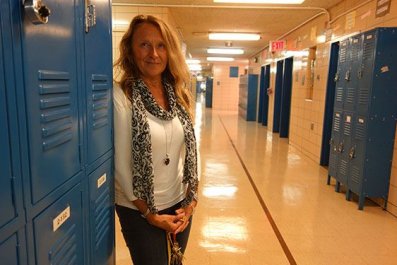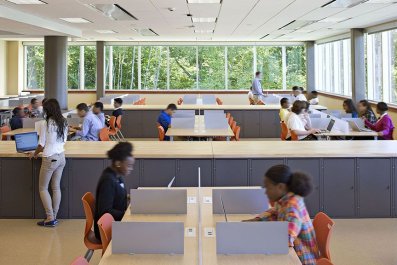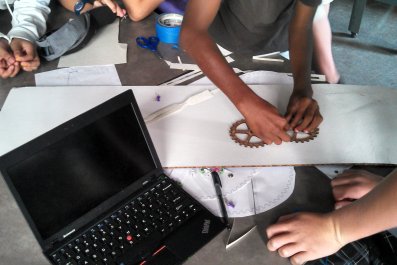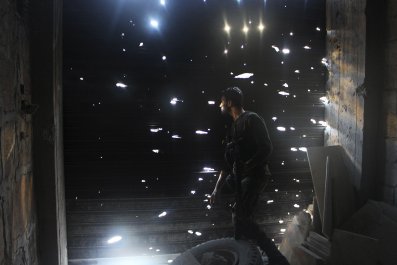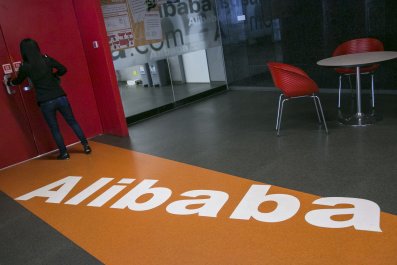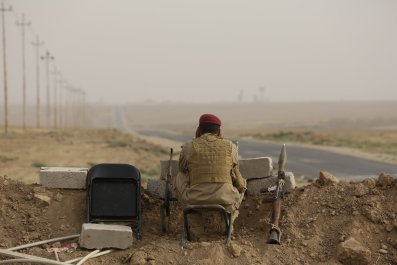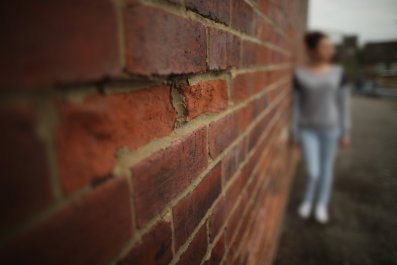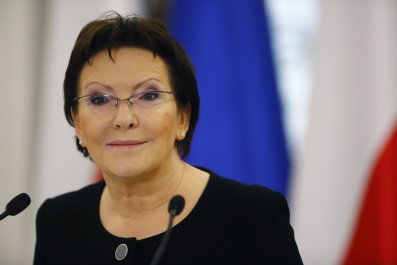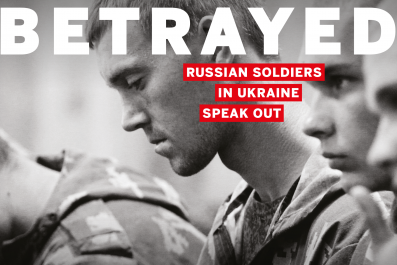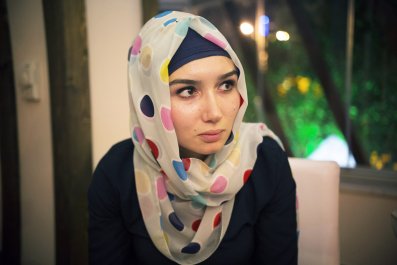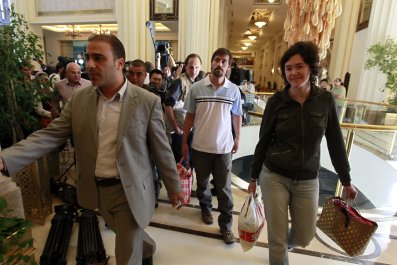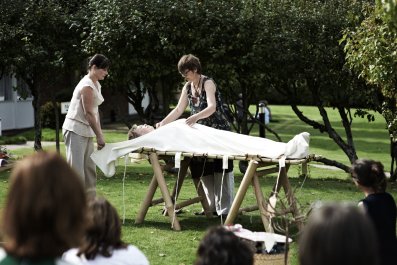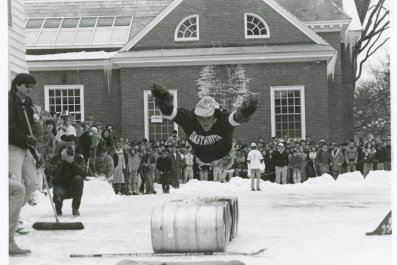It's 4pm in Damascus and Umabdul al Halabi (Abdul's Mother From Aleppo) is showing on Halab Today TV. It's a sitcom; inside a barber's shop, a fat man is being shaved by a man with silly hair. "The heroine is a mother with a son called Abdul. The show is about what we civilians are suffering in Syria – water problems, no food, how to deal with the issues – but it's funny," explains Khaleel Agha, the 43-year-old manager of Halab Today TV, a Syrian opposition satellite TV channel. "It's made by a team inside Aleppo called Bokra Ahla (Tomorrow Will be Better). Comedy is one way of fighting the regime."
Umabdul is broadcast daily in 10-minute episodes, part of the station's 24/7 schedule. Like much of Halab Today TV's output, Umabdul's production values are poor and it is all filmed indoors, but it represents a miracle of resistance to President Bashar al-Assad and the forces of Isis, the fundamentalist militia that calls itself the Islamic State, which has recently captured swathes of territory in Syria and in Iraq. In the last few weeks, Isis has decapitated two American journalists and Syrian journalists are also targeted. One of Halab Today TV's journalists was recently kidnapped and killed by Isis; another wounded. A third, now in Turkey, only escaped Isis when his prison was bombed.
"Our main challenge for the TV station is fear," said Agha. Halab Today TV's original enemy is the Assad regime, whose airforce still bombs Aleppo daily with barrels of explosives and shrapnel. "Our outside set was destroyed by barrel bombs while we were filming. We get about 35 barrel bombs a day on average in Aleppo, and 20–50 civilian casualties. You can still hear bombs while we are filming and see the cast's reactions."
Halab Today TV is part of a spontaneous journalistic movement in opposition-held parts of Syria. The station has at least two main rivals, Orient TV and Souria Al Ghad, who transmit from Dubai and Cairo. Until the revolution began three years ago, Syria had only three government controlled-national newspapers, and only state radio and TV. This media is not just documenting the revolution, it's born from it.
Agha is speaking on Skype from Turkey, where the office has 50 staff in an unnamed location. Twelve staff members are still based in Aleppo, the largest city in Syria, with a pre-war population of more than two million. It has been the scene of bitter fighting for the last two years. Estimates vary between 13,500–23,000 dead. The city is divided between Syrian government and opposition forces, and Isis massing on its eastern flank.
The station focuses on news from Syria, documentaries, video footage by citizen journalists and religious programmes. "We show that real Islam is not about killing," says Agha. Halab TV was founded in 2012 by an Aleppo businessman who wishes to remain anonymous.
Before he was asked to run the station, Agha, a former factory manager, had no media experience: "None of my staff has previous experience. We've learnt everything from the internet." The media revolution began in April 2011, when people first took to the streets. Assad swiftly banned foreign journalists; Syrians began filming the uprising on mobile phones and posting footage on the internet, or sending it to international broadcasters.
"They wanted to tell the world what was happening," says Armand Hurault of ASML (Association de Soutien aux Medias Libres), a Paris-based media NGO and implementing partner of Smart, the Syrian Media Action Revolution Team. ASML and Smart currently work with 300 people throughout Syria, Turkey, Jordan and France, supporting three radio stations, 12 newspapers and a dozen media offices inside Syria, giving video-camera lessons on Skype, providing computers, printers, paper and ink, money and technical assistance.
"Smart is by the largest Syrian independent media network as far as we know," said Tamara Al Khoury of the Brussels-based civil rights NGO, the European Endowment for Democracy, who gave Smart a €129,000 grant for 2014. "There are other NGOs supporting media in Syria, but most are supporting online media, which is a problem as there is only intermittent electricity in Syria."
The independent Syrian media came of age, however, a year ago, after Assad regime's chemical weapons' attack on the Damascus suburb of Ghouta in August 2013. "Until then, Syrians had hoped that if they posted videos on the internet, the world would come and sort it out," says Robin Yassin-Kassab, the half-Syrian British author of The Road from Damascus, who still regularly travels to Syria. It's difficult to estimate how many independent magazines, newspapers and radio stations there are now, as most are very local and, in regime-controlled areas, underground; some of the radio stations are only online. According to Smart, there are about 500 print journals and about 20 radio stations. In April 2011, Smart began smuggling modems into Syria to help video-activists broadcast their stories.
"By the end of 2011 we had over 200 modems in Syria," says Chamsy Sarkis over Skype. The 40-year-old Paris-bred son of an exiled Syrian dissident lawyer, raised in the dream of Syrian democracy, Sarkis co-founded Smart with four other Syrian expats, at the very start of the uprising. A biotech researcher at CNRS, France's National Centre for Scientific Research, he met the others at a demonstration in Paris in April 2011. "Our broadcasts were taken by lots of international channels, Al Jazeera, Channel 4. We thought the regime would be deterred from killing people if the demonstrations were shown live on TV," says Sarkis. "And, initially, that was true."
Smart spent months training video-activists on Skype so their footage would meet international TV standards. They recently set up a network of radio antennae and, earlier this year, founded their own radio station, Hawa Smart, blurring the line between supporting a free media and becoming a part of it. Smart's offices in Syria have been bombed by Assad and attacked by Isis; one of its correspondents was killed by a sniper.
Internet activists face sinister challenges. "Facebook has been their primary shop window, but recently people have been contacting Facebook and saying the videos on the pages are in contravention of its rules on violent content," says Duncan Furey of the London-based Institute of War and Peace Reporting (IWPR), which supports various Syrian media outlets. "We don't know who these people are, but the assumption is they are from Assad's regime." IWPR has now set up 20 websites, hosted in America. It also gives grants of up to $5,000 to groups of activists, in order to help them print and distribute papers. "Enough to buy a generator, fuel and colour printer cartridges."
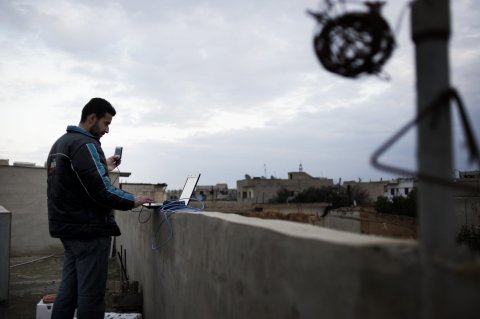
Initially, the founders of Smart say, they used their own money, then cajoled family and friends to donate as costs grew. Each modem cost $1,500 and live broadcasts cost between $17 and $20 a minute. From 2012, Smart got funding from the Syrian National Council, the umbrella group of the Syrian opposition. Now funded by a mixture of private donations and NGOs, Smart declined to specify the details of its financial donors.
Meanwhile, on the ground, video activism was evolving into a homegrown journalistic scene with tiny local papers and online radio stations broadcasting openly in the liberated areas and underground in those still under Assad's control. It was driven both by a desire for information and new-found freedom of speech.
"Journalists found they could write whatever they wanted in the liberated areas," says Orwa Mohammed, the 25-year-old producer of Hawa Smart Radio. Unlike many of the new generation of Syrian media people, Mohammed was a journalist before the war in Damascus. "Before, we had censorship on everything."
Raed Faris founded and runs Radio Fresh in Kafranbel, an opposition-held town in Idlib province, as well as a media centre and four monthly magazines. Faris, 43, a pre-war property developer, began in 2011 organising demonstrations, filming them and putting them on YouTube. Now he owns his own generator and transmitter, broadcasting 16 hours a day to Hama and Idlib, with 50 employees and 20 volunteers. "We broadcast news," he says. "English and French lessons. Programmes for children, for women, for the Free Syrian Army; to the regime army so they can see we are not terrorists. We have four hours a day teaching real Islam, not the one of Isis and the extremists."
The majority of Syria's independent media outlets, like Faris's media centre, were originally set up and run by volunteers, who paid the expenses themselves.
Extra funding came from private donations from Syrians, some abroad, some locally, slowly building up support from NGOs. As most of these magazines only have a local circulation of a few hundred, and online radio is very cheap, the costs were not overwhelming. Halab Today TV, according to Agha, is entirely privately funded by expat Syrian businessmen, at a cost of $70,000 a month – largely in cash. "I am always having to send people to Aleppo with lots of cash." But as the war has worn on, the media outlets became more professional, their expenses greater, and Syrians themselves poorer.
Faris's funding now largely comes from Syrian Americans and the US government – who gave him the money to set up Radio Fresh. The EED helped refurbish his media centre with laptops, printers and flak jackets.
"A lot of money has been chucked at Syrian independent media," says Furey of IWPR. "The American government agency the CSO [Bureau of Conflict and Stabilisation Operations] funds a lot of media programmes, as do the British."
A UK Foreign Office spokesman confirmed that they had trained more than 300 Syrian journalists and activists, at the request of Syria's opposition National Coalition: "This is part of a package of more than £50m of practical support . . . to help deliver basic services to the Syrian people, and to promote accountability, human rights and independent media."
According to Smart-ASML, a small publication inside Syria can be run for a couple of thousand euros a month; but a magazine with an office outside Syria, and correspondents in country, can cost up to €10,000 a month. EED's grant to Smart is aimed at doubling the distribution of local magazines supported by Smart.
Both the regime and the Islamists recognise that this nascent free press is not just born from the original secular revolution, but an integral part of its survival. Furey of the IWPR reiterated that the lines between Syrian activists and independent media are often very blurred.
"We interpret this as broadly as we can," he says. "It's a transient community because they are under threat. Many of the people we worked with have been tortured or killed." The political cartoonist Ali Ferzat had his hands broken by government troops. The Syrian singer Ibrahim Qashoush, famous for singing revolutionary songs, was found dead with his vocal chords ripped out. The opposition blames Assad's forces.
At Halab TV, Agha has set up strict rules to protect his staff. "Our reporters work in teams of three, but none of the other teams know each other. If one team is captured, I don't want to lose everyone else. None of them show their faces on TV. I have software that disguises their voices," he says.
"They all work from home. We used to have an office but the regime bombed it and Isis kept coming to search it." Halab Today TV's two anchormen and two anchorwomen women do show their faces on TV, but work under false names and are based in Turkey.
At Radio Fresh, Faris was shot by Isis and left for dead in January 2014, just after he'd come back from a high profile US tour of Syrian expats and US politicians. His media centre was also attacked and robbed in January, by Isis, he says.
Despite being attacked, he has no intention of stopping his radio station and demonstrations until Assad has fallen. "I told them in the US," says Raed. "'Don't despair! We're building a new Syria.'"



